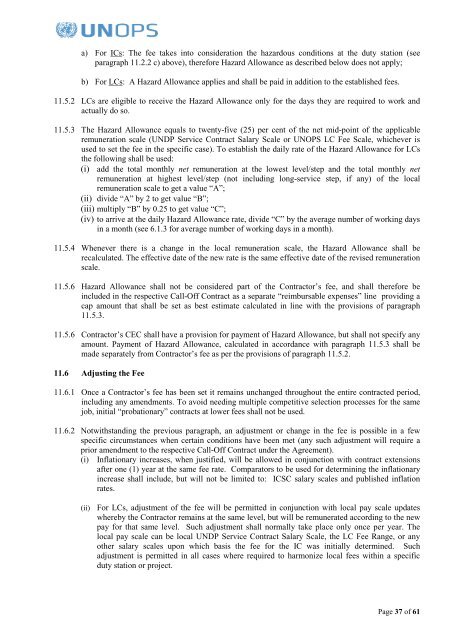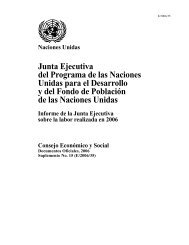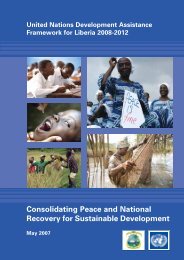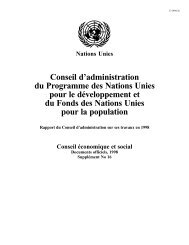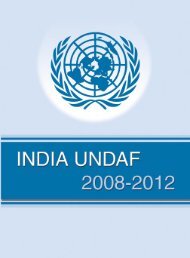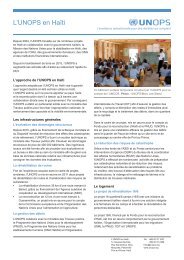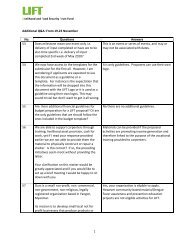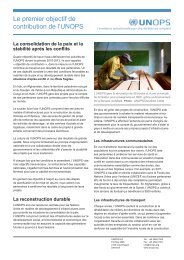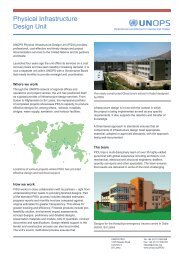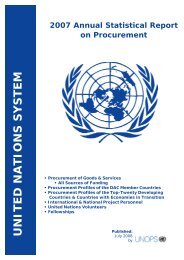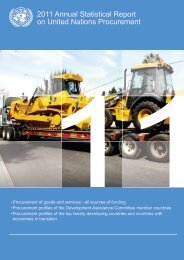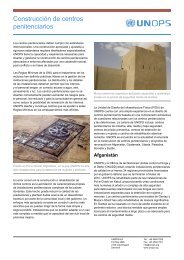ANNEX II - UNOPS
ANNEX II - UNOPS
ANNEX II - UNOPS
You also want an ePaper? Increase the reach of your titles
YUMPU automatically turns print PDFs into web optimized ePapers that Google loves.
a) For ICs: The fee takes into consideration the hazardous conditions at the duty station (see<br />
paragraph 11.2.2 c) above), therefore Hazard Allowance as described below does not apply;<br />
b) For LCs: A Hazard Allowance applies and shall be paid in addition to the established fees.<br />
11.5.2 LCs are eligible to receive the Hazard Allowance only for the days they are required to work and<br />
actually do so.<br />
11.5.3 The Hazard Allowance equals to twenty-five (25) per cent of the net mid-point of the applicable<br />
remuneration scale (UNDP Service Contract Salary Scale or <strong>UNOPS</strong> LC Fee Scale, whichever is<br />
used to set the fee in the specific case). To establish the daily rate of the Hazard Allowance for LCs<br />
the following shall be used:<br />
(i) add the total monthly net remuneration at the lowest level/step and the total monthly net<br />
remuneration at highest level/step (not including long-service step, if any) of the local<br />
remuneration scale to get a value “A”;<br />
(ii) divide “A” by 2 to get value “B”;<br />
(iii) multiply “B” by 0.25 to get value “C”;<br />
(iv) to arrive at the daily Hazard Allowance rate, divide “C” by the average number of working days<br />
in a month (see 6.1.3 for average number of working days in a month).<br />
11.5.4 Whenever there is a change in the local remuneration scale, the Hazard Allowance shall be<br />
recalculated. The effective date of the new rate is the same effective date of the revised remuneration<br />
scale.<br />
11.5.6 Hazard Allowance shall not be considered part of the Contractor’s fee, and shall therefore be<br />
included in the respective Call-Off Contract as a separate “reimbursable expenses” line providing a<br />
cap amount that shall be set as best estimate calculated in line with the provisions of paragraph<br />
11.5.3.<br />
11.5.6 Contractor’s CEC shall have a provision for payment of Hazard Allowance, but shall not specify any<br />
amount. Payment of Hazard Allowance, calculated in accordance with paragraph 11.5.3 shall be<br />
made separately from Contractor’s fee as per the provisions of paragraph 11.5.2.<br />
11.6 Adjusting the Fee<br />
11.6.1 Once a Contractor’s fee has been set it remains unchanged throughout the entire contracted period,<br />
including any amendments. To avoid needing multiple competitive selection processes for the same<br />
job, initial “probationary” contracts at lower fees shall not be used.<br />
11.6.2 Notwithstanding the previous paragraph, an adjustment or change in the fee is possible in a few<br />
specific circumstances when certain conditions have been met (any such adjustment will require a<br />
prior amendment to the respective Call-Off Contract under the Agreement).<br />
(i) Inflationary increases, when justified, will be allowed in conjunction with contract extensions<br />
after one (1) year at the same fee rate. Comparators to be used for determining the inflationary<br />
increase shall include, but will not be limited to: ICSC salary scales and published inflation<br />
rates.<br />
(ii) For LCs, adjustment of the fee will be permitted in conjunction with local pay scale updates<br />
whereby the Contractor remains at the same level, but will be remunerated according to the new<br />
pay for that same level. Such adjustment shall normally take place only once per year. The<br />
local pay scale can be local UNDP Service Contract Salary Scale, the LC Fee Range, or any<br />
other salary scales upon which basis the fee for the IC was initially determined. Such<br />
adjustment is permitted in all cases where required to harmonize local fees within a specific<br />
duty station or project.<br />
Page 37 of 61


